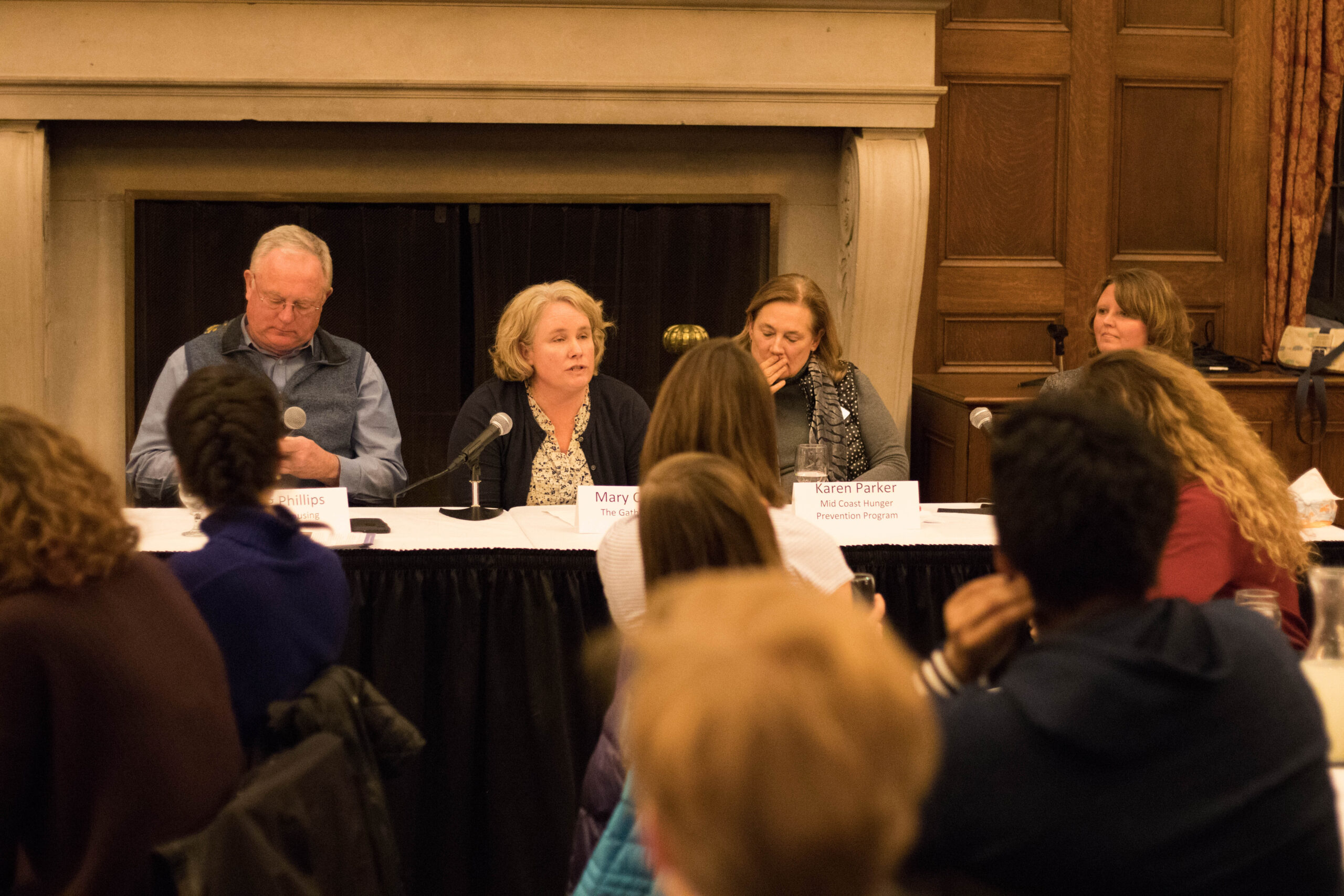‘Core 4’ panel highlights community challenges
March 6, 2019

For the four executive directors of the biggest social service organizations in Brunswick, collaboration is the key to successfully meeting the needs of the community.
Karen Parker of Midcoast Hunger Prevention Program (MCHPP), Anita Ruff of Oasis Free Clinics, Craig Phillips of Tedford Housing and Mary Connolly of The Gathering Place were invited to Main Lounge on Tuesday evening to discuss their experiences as leaders of nonprofits in the Brunswick community. More than 60 students and community members had the opportunity to attend the panel, organized by Annie Rose ’20, fellow at the Joseph McKeen Center for the Common Good.
The panel, which grew from the McKeen Center Leading for the Common Good series, was designed to expose Bowdoin students to nonprofits working with the local community and start a conversation about what community engagement should look like at an institution like Bowdoin. Rose said the idea sprang from her experience working as Maine Community Fellow at Tedford Housing last summer.
“I had this incredible opportunity to see how they work together,” she said. “[The goal is] letting students get a better understanding of the challenges facing the Brunswick community, and how these organizations work together to meet those challenges.”
The panelists spoke about how their organizations and missions had expanded in response to a growing understanding of the challenges faced by Brunswick residents. For example, Oasis Free Clinics opened in 1992 as a collaboration with Tedford Housing, when local doctors began providing free healthcare services to people experiencing homelessness.
“[The doctors] started providing free services one Tuesday night a month … and then realized that the need for free healthcare was greater than just those who were homeless,” said Ruff.
Since its inception, Oasis Free Clinics has also begun providing access to prescription medication through its Community Prescription Assistance Program, which distributes about a million dollars worth of free medications every year.
Parker noted that, since MCHPP had started in 1983 in a church basement, awareness of food insecurity in Brunswick and surrounding towns had increased. She explained that Maine faces particularly high rates of food insecurity—the highest in New England. MCHPP’s mission is to fill the gap between food people need and food they are able to consistently purchase. Last year, the organization distributed 370,000 meals to people experiencing hunger in the area.
Collaboration between the four organizations is critical to their success in addressing the challenges faced by the Brunswick community, particularly when it comes to securing funding. Ruff explained that under the last gubernatorial administration, many social service agencies lost some of their state funding, and had to turn to foundations to make up the difference. That meant more competition for funding among local organizations like the “Core 4.” But Brunswick organizations have found creative ways to work together in order to ensure that the needs of the community are met. This year, for example, the four organizations decided to join together in supporting the bid of Tedford Housing in a write-in competition to gain financial support from a local bank, rather than competing separately and splitting the vote.
“We know if we’re in trouble [that] we have each others’ backs,” said Phillips, the director of Tedford.
For Rose, one of the most important learning goals of the panel and of the Leading for the Common Good series is an understanding of how Bowdoin students can engage with their community, and the world, in a meaningful way. In order to do so, she says, students must listen to the needs of the people with whom they are interacting rather than simply entering a community and imposing their service without first participating in thoughtful conversation.
It’s important to learn to balance your ambition with your humility,” she said.
Students left the panel with an increased awareness of the complex relationship between Bowdoin and the community organizations and residents of Brunswick, as well as a renewed commitment to the common good. Nina Badger ’22 said that she was inspired by the attention paid by the executive directors to the special contributions of each client they served.
“It was refreshing to hear the directors say that they didn’t see it as what they could do for their clients, but rather as how they could help their clients find success for themselves,” she said.
Connolly’s words exemplified this sentiment as she expressed affection for the people she encounters at the Gathering Place.
“The homeless community in Brunswick is such a special community of people.”

Comments
Before submitting a comment, please review our comment policy. Some key points from the policy: